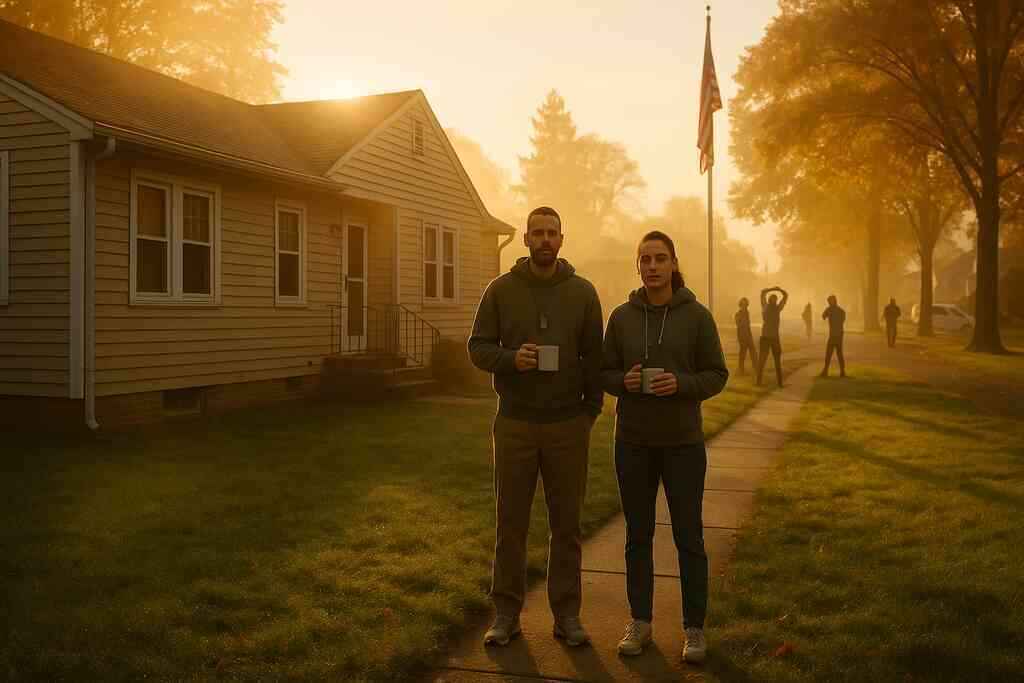
How Top Sober House Alaska Enhances Community Support
August 25, 2025
Embarking on the Alaskan Sobriety Odyssey
The Alaskan Landscape of Recovery
In the majestic expanses of Alaska, the journey toward recovery is framed by its vast landscapes and close-knit communities. This unique environment offers a rich backdrop for those seeking recovery from substance use disorder. While remote, these settings foster a deeply connected community support network vital for long-term sobriety. Recognizing this, sober living houses in Alaska are specifically tailored to embrace the tranquility and resilience of the Alaskan wilderness. These sober living houses establish a harmonized balance between isolation and accessibility to resources, making them essential pillars in the state’s recovery landscape.
Top Sober House: Guiding the Northern Lights of Sobriety
Top Sober House stands as a beacon of hope in Alaska, facilitating enduring recovery journeys across its communities. Through a comprehensive approach that intertwines local culture with structured programs, it guides individuals toward a shining path of sobriety. The services provided here are not merely about abstaining from substances; they encapsulate a holistic journey toward healing and self-discovery. With strategic engagement and tailored support, those within the northern sobriety solutions are empowered to navigate their recovery paths effectively. This support network is enriched with resources and guidance to adapt to the Alaskan way of life, promoting sustainable recovery and well-being.
The Quest for Substance-Free Anchorage
Anchorage plays a pivotal role as the hub for addiction recovery support in the state. The quest for a substance-free Anchorage is driven by a strong community network that embraces diversity and resilience. By integrating local initiatives with established recovery programs, individuals are afforded valuable peer-driven support in Alaska’s largest city. Anchorage offers a vibrant recovery network that connects individuals with vital resources, encompassing various support groups, counseling services, and rehabilitation programs. Through concerted efforts, the community fosters an environment where the residents actively participate in each other’s recovery journey, creating a supportive and substance-free Anchorage.
The Foundations of Community Empowerment
Peer-Driven Support: The Heartbeat of Juneau’s Sober Community
In the heart of Juneau, peer-driven support forms the cornerstone of the sober community. This grassroots approach empowers individuals through shared experiences and mutual encouragement. By weaving personal stories into the fabric of recovery, individuals are emboldened to face their challenges head-on. In Juneau, the recovery network thrives on solidarity, making it a haven for those seeking a supportive environment. Such a community-focused model is integral to fostering resilience and long-term sobriety among its members. Peer-driven support in Alaska serves as a testament to the profound impact of collective strength.
Anchorage’s Recovery Network: Building Bridges to Sobriety
Anchorage’s recovery network is an intricate tapestry of support programs and initiatives designed to guide individuals toward sobriety. This network seamlessly integrates peer support, professional counseling, and practical resources, all aimed at empowering individuals on their recovery journeys. By fostering connections among various support groups and resources, Anchorage creates a strong safety net, encouraging ongoing commitment to a substance-free life. The strategic involvement of community members in this network ensures that everyone has access to a comprehensive support system. This vibrant community-centric approach plays a crucial role in Addiction recovery support in Anchorage, providing a robust framework for individuals pursuing sobriety.
Empowering Alaskan Residents through Indigenous Recovery Support
Alaska’s vast and diverse landscape includes rich indigenous traditions that have been integrated into recovery programs across the state. By embracing cultural heritage and traditional practices, these indigenous recovery programs provide culturally relevant support for Alaskan residents. They empower individuals by aligning recovery with identity, making the journey toward sobriety a culturally attuned path. Not only do these programs offer healing through cultural connection, but they also promote a sense of belonging and community. Alaska’s indigenous recovery programs demonstrate the power of blending cultural wisdom with modern recovery practices, creating a personalized and effective approach to sobriety.

Pathways to Resilient Recovery
Navigating the Recovery Journey in Alaska
Embarking on the recovery journey in Alaska requires a unique blend of resources and support, catering to the vast and varied needs of Alaskan residents. The path to sobriety is navigated with an emphasis on community involvement and connectivity to culturally relevant resources. Top sober houses, such as those cataloged in Sober living houses in Alaska, provide essential infrastructure for this journey. These facilities are not just residential treatment centers but supportive environments where residents can rediscover their identities and build meaningful connections. The Alaskan recovery journey is thus marked by resilience, with individuals traversing a landscape rich in both challenges and profound opportunities for personal growth.
To reinforce long-term recovery, it is vital to focus on the recovery journey as a holistic process involving mind, body, and spirit. Group homes and peer support systems play a significant role, offering a safe place for residents to share experiences and gain insights from one another. The broader Alaskan community, infused with traditional wisdom and modern strategies, empowers each individual’s recovery journey. Through this synergy, Alaska not only aids in overcoming substance use disorder but also in weaving a robust community fabric geared towards collective healing and sustainable progress.
Harnessing Local Initiatives for Community Reintegration
Local initiatives are instrumental in aiding community reintegration, forming bridges back to everyday life post-recovery. In Alaska, these initiatives are characterized by adaptive strategies that cater to the distinct demands of its diverse regions, from urban centers like Anchorage to remote villages. The incorporation of culturally sensitive approaches through indigenous recovery support plays a critical role in successful reintegration. Programs focusing on community involvement and empowerment help residents take essential steps towards permanent sobriety while maintaining cultural identity.
These efforts range from employment assistance programs to cultural events that foster community reintegration. By delivering tailored support, local initiatives transform the recovery narrative into one of empowerment and self-discovery. Engagement with sober living environments and support groups encourages individuals to take ownership of their recovery paths and actively contribute to their communities. Thus, local initiatives are not merely adjuncts to recovery but integral components that nourish the soul of recovery efforts in Alaska.
Fostering Long-term Sobriety: The Role of Alaskan Support Systems
Long-term sobriety in Alaska thrives on a network of well-established support systems that include both conventional and innovative approaches to recovery assistance. Supportive networks in Alaska are fortified by resources such as Alcoholics Anonymous and peer-driven support, creating a comprehensive safety net for those in recovery. These systems emphasize collaboration between community support for recovery and professional guidance, ensuring a sustainable path towards sobriety.
The integration of residential treatment centers with practical sobriety initiatives, found in urban and rural settings alike, plays a pivotal role in maintaining fragility into strength. Through continuous engagement with resources like support groups and structured sober living programs, Alaskan residents are provided a reliable framework to practice and uphold their sobriety. Support systems in Alaska not only address the immediate challenges of recovery but also promote lifelong resilience and personal growth through empowering social connections and ongoing support structures.
In summary, Alaskan support systems foster long-term sobriety by creating interconnected, culturally resonant, and resilient communities. These support mechanisms, enriched by a landscape that is both unique and challenging, exemplify the commitment to nurturing sustainable sobriety across diverse Alaskan communities.
Alaska’s Community Pillars of Sobriety
Rural Recovery: Overcoming Northern Challenges
The rugged terrain of Alaska presents unique hurdles, particularly for rural recovery efforts. Residents in more isolated regions face challenges such as limited access to treatment facilities and support networks. However, the adaptability and resilience of Alaskan sober living initiatives rise to meet these needs head-on. By tailoring resources and support for rural recovery support in Alaska, these communities demonstrate an incredible capacity to overcome geographic barriers. Moreover, the integration of technology and communications systems enhances access to vital recovery resources, ensuring that even the most remote individuals have a connection to essential support.
Collaborative efforts in rural areas emphasize building local infrastructure to facilitate a nurturing recovery environment. Partnerships with local leaders and indigenous communities play a pivotal role in enhancing the accessibility of recovery programs. These alliances are instrumental in fostering community-centric approaches that are both sustainable and adaptable to local conditions. By prioritizing empowerment and inclusivity, Alaskan rural recovery initiatives lay a robust foundation for long-lasting sobriety and transformative personal growth.
The Role of Sober Living Programs in Alaskan Success Stories
Sober living programs are critical components in the tapestry of Alaskan recovery success stories. These programs provide structured environments that reinforce the discipline and routine essential for early recovery periods. By cultivating a practical sobriety initiative, these living arrangements offer residents stability and a steadfast path toward transformative life changes. Sober living houses emphasize peer support, serving as a crucial element in fostering communal bonds and a shared commitment to sobriety.
Furthermore, these programs integrate traditional Alaskan values with recovery-oriented structures, allowing residents to embrace their cultural heritage while pursuing sobriety. Through supportive frameworks and compassionate guidance, sober living environments equip individuals with the tools needed to achieve lasting change. By promoting accountability and fostering self-sufficiency, these programs are pivotal in transforming lives across Alaska, encouraging each resident to become an active participant in their recovery journey.
Uplifting Alaskan Communities through Collaborative Initiatives
Collaborative initiatives are the backbone of comprehensive recovery support systems in Alaska. These efforts connect diverse sectors, including healthcare providers, indigenous groups, and community leaders, to establish a cohesive support network. Through partnerships, resources are effectively mobilized to meet the multifaceted needs of individuals in recovery. Empowerment-focused strategies, such as inclusive community events and outreach programs, are designed to nurture recovery-friendly environments throughout Alaska.
The shared ambition to empower individuals through sobriety underpins many of these efforts. By merging innovative recovery practices with traditional cultural values, these initiatives not only facilitate recovery but also strengthen communal bonds. Support systems established through collaboration bring together local knowledge and expertise, providing a robust response to addiction challenges. Through these enduring partnerships, Alaska cultivates a landscape where individuals are supported comprehensively on their paths to sobriety, ensuring hope and resilience are available to all seeking recovery.

Reflective Paths to a Sober Future
The Alaskan Tapestry of Healing and Growth
Alaska’s unique landscape not only captivates with its natural beauty but also serves as an integral setting for inspiring recovery narratives. This tapestry of healing and growth is woven with diverse threads of cultural richness, from indigenous traditions to community-driven initiatives. Each story of sobriety unfolds with a rich blend of ancient practices and modern advancements, making the journey authentically Alaskan. Programs such as Northern sobriety solutions demonstrate the progressive integration of these elements, offering a comprehensive framework for recovery. Through collective efforts, both rural and urban communities embrace a holistic approach, fostering environments where healing is not just possible but sustainable. As individuals walk their recovery paths, they contribute to this vibrant tapestry, reinforcing a legacy of resilience and shared triumph over adversity.
Looking Ahead: Continuously Nurturing Alaska’s Recovery Connections
As Alaska steps forward on its recovery journey, the focus remains on nurturing and strengthening community bonds. These connections, pivotal to sustaining long-term sobriety, are reinforced by inclusive initiatives and responsive support systems. Through platforms in Anchorage and Fairbanks, efforts focus on expanding outreach and accessibility. Such initiatives underscore the importance of seamless integration between residents and recovery resources, ensuring everyone has the support they need to thrive. Programs that emphasize community reintegration and ongoing encouragement invite Alaskans to actively participate in shaping a supportive, recovery-oriented culture. By doing so, they solidify a network where the journey to sobriety is a collective endeavor, continuously nurtured through meaningful engagement and mutual support.
Cultivating a Bright, Substance-Free Tomorrow
The journey toward a substance-free Alaska is one of collective hope and determination. By cultivating a robust framework rooted in cultural awareness and collaborative efforts, the state is poised to achieve longstanding sobriety milestones. Key to this vision is the integration of resources such as Fairbanks sober living environments and wider community support structures that underscore the importance of stable, inclusive environments. These elements serve as the bedrock for individuals at every stage of their recovery, promoting self-sufficiency and empowerment. Looking toward the future, Alaska envisions a landscape where individuals are equipped with the tools and confidence needed to sustain their recovery journeys, fostering a brighter, more resilient tomorrow for all. Through strategic initiatives and a commitment to transformative support, Alaskan communities are redefining the narratives of addiction and recovery, setting a powerful precedent for sustainable sobriety.
Frequently Asked Questions
Question: What role does Top Sober House play in Alaska’s community-based sobriety initiatives?
Answer: Top Sober House is integral to Alaska’s community-based sobriety efforts. By providing a comprehensive directory of sober living houses, it connects individuals with the supportive environments they need. Whether it’s in Anchorage, Fairbanks, or more rural areas, the focus is on accessible recovery resources that align with local cultural values. Top Sober House empowers residents by facilitating their journey towards sobriety through peer-driven support and structured programs.
Question: How does Top Sober House contribute to indigenous recovery support systems in Alaska?
Answer: Top Sober House collaborates closely with indigenous communities to incorporate traditional practices into recovery support systems. This synergy not only respects but also amplifies the cultural strengths inherent in indigenous traditions. By aligning recovery programs with these cultural practices, Top Sober House enhances the efficacy of sobriety initiatives, ensuring that Alaskan residents receive culturally relevant and resonant support.
Question: Can Top Sober House effectively support those seeking a substance-free Anchorage?
Answer: Absolutely! Top Sober House is a valuable ally for anyone aiming for a substance-free life in Anchorage. The rich network of support provided connects individuals with vital resources such as supportive group homes, counseling services, and peer support networks. By promoting a community-oriented recovery journey, Top Sober House helps transform Anchorage into a hub of resilience and sobriety success.
Question: How does the blog post titled ‘How Top Sober House Alaska Enhances Community Support’ illustrate the organization’s role in empowering Alaskan residents?
Answer: The blog post ‘How Top Sober House Alaska Enhances Community Support’ highlights how Top Sober House plays a pivotal role in empowering Alaskan residents. Through initiatives such as indigenous recovery support and peer-driven community models, Top Sober House helps weave a robust community fabric. This empowerment extends beyond sobriety, fostering personal growth and community reintegration, evident in diverse Alaskan areas.
Question: How do Top Sober House initiatives facilitate rural recovery support in Alaska?
Answer: Top Sober House recognizes the unique challenges faced by rural Alaskan communities in accessing recovery resources. By leveraging technology and building local partnerships, the organization ensures that even remote areas have access to essential support systems. These initiatives prioritize sustainable recovery through community involvement and a personalized, culturally sensitive approach.


